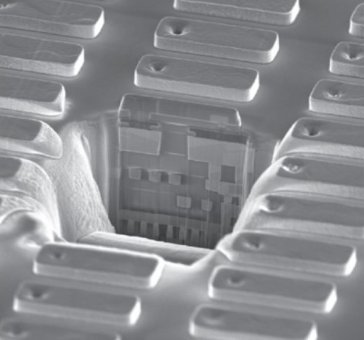CEA-Leti Paper in Nature Communications Reports First Complete Memristor-Based Bayesian Neural Network Implementation For Real-World Task
Breakthrough Classifies Types of Arrhythmia Recordings With Precise Aleatoric and Epistemic Uncertainty
GRENOBLE, France – Dec. 7, 2023 – A team comprising CEA-Leti, CEA-List and two CNRS laboratories has published a new paper in Nature Communications presenting the first complete memristor-based Bayesian neural network implementation for a real-world task—classifying types of arrhythmia recordings with precise aleatoric and epistemic uncertainty.
Considering medical-diagnosis and other safety-critical, sensory-processing applications that require accurate decisions based on a small amount of noisy input data, the study notes that while Bayesian neural networks excel at such tasks because they provide predictive uncertainty assessment, their probabilistic nature requires increased use of energy and computation. The increase is caused by the fact that implementing the networks in hardware requires a random number generator to store the probability distributions, i.e. synaptic weights.
“Our paper presents, for the first time, a complete hardware implementation of a Bayesian neural network utilizing the intrinsic variability of memristors to store these probability distributions,” said Elisa Vianello, CEA-Leti chief scientist and co-author of the paper, “Bringing Uncertainty Quantification to the Extreme-Edge with Memristor-Based Bayesian Neural Networks”. “We exploited the intrinsic variability of memristors to store these probability distributions, instead of using random number generators.”
A second major challenge was that performing inference in the team’s approach requires massive parallel multiply-and-accumulate (MAC) operations.
“These operations are power-hungry when carried out on CMOS-based ASICs and field-programmable gate arrays, due to the shuttling of data between processor and memory,” Vianello said. “In our solution, we use crossbars of memristors that naturally implement the multiplication between the input voltage and the probabilistic synaptic weight through Ohm’s law, and the accumulation through Kirchhoff’s current law, to significantly lower power consumption.”
Reconciling Memristors and Bayesian Neural Networks
Co-author Damien Querlioz, a scientist associated with the University of Paris-Saclay, the French National Center for Scientific Research (CNRS) and the Center of Nanosciences and Nanotechnologies, said the team also had to reconcile the nature of memristors, whose statistical effects adhere to the laws of device physics, with Bayesian neural networks, in which these effects can take arbitrary shapes.
“This work overcomes that challenge with a new training algorithm – variational inference augmented by a ‘technological loss’ – that accommodates device non-idealities during the learning phase,” he said. “Our approach enables the Bayesian neural network to be compatible with the imperfections of our memristors.”
Uncertainty quantification involves the network's ability to identify unknown situations out-of-distributions.
If a traditional neural network trained to recognize cats and dogs is presented with an image of a giraffe, it “confidently misclassifies” it as a cat or a dog, Vianello said. “In contrast, a Bayesian neural network would respond, ‘I am not entirely sure what this is because I have never seen it.’ While this example is lighthearted, in critical environments like medical diagnosis, where incorrect predictions can have severe consequences, this uncertainty-capturing ability becomes crucial.”
This capability arises from the fact that synaptic values in Bayesian neural networks are not precise values, as in traditional neural networks, but rather probability distributions. Consequently, the output is also a probability distribution, providing information about its “certainty”.

Scanning Electron Microscopy image of a filamentary memristor in the back end of line of our hybrid memristor/CMOS process
About CEA-Leti (France)
CEA-Leti, a technology research institute at CEA, is a global leader in miniaturization technologies enabling smart, energy-efficient and secure solutions for industry. Founded in 1967, CEA-Leti pioneers micro-& nanotechnologies, tailoring differentiating applicative solutions for global companies, SMEs and startups. CEA-Leti tackles critical challenges in healthcare, energy and digital migration. From sensors to data processing and computing solutions, CEA-Leti’s multidisciplinary teams deliver solid expertise, leveraging world-class pre-industrialization facilities. With a staff of more than 2,000 talents, a portfolio of 3,200 patents, 11,000 sq. meters of cleanroom space and a clear IP policy, the institute is based in Grenoble, France, and has offices in Silicon Valley, Brussels and Tokyo. CEA-Leti has launched 75 startups and is a member of the Carnot Institutes network. Follow us on www.leti-cea.com .
Technological expertise
CEA has a key role in transferring scientific knowledge and innovation from research to industry. This high-level technological research is carried out in particular in electronic and integrated systems, from microscale to nanoscale. It has a wide range of industrial applications in the fields of transport, health, safety and telecommunications, contributing to the creation of high-quality and competitive products.
For more information: www.cea.fr/english
Related Semiconductor IP
- Multi-channel Ultra Ethernet TSS Transform Engine
- Configurable CPU tailored precisely to your needs
- Ultra high-performance low-power ADC
- HiFi iQ DSP
- CXL 4 Verification IP
Related News
- Cadence Announces New Tensilica Vision P6 DSP Targeting Embedded Neural Network Applications
- CEVA's 2nd Generation Neural Network Software Framework Extends Support for Artificial Intelligence Including Google's TensorFlow
- Khronos Launches Dual Neural Network Standard Initiatives
- Neurala Announces $14 Million Series A to Bring Deep Learning Neural Network AI Software to Drones, Self-Driving Cars, Toys and Cameras
Latest News
- SEALSQ and Lattice Collaborate to Deliver Unified TPM-FPGA Architecture for Post-Quantum Security
- SEMIFIVE Partners with Niobium to Develop FHE Accelerator, Driving U.S. Market Expansion
- TASKING Delivers Advanced Worst-Case Timing Coupling Analysis and Mitigation for Multicore Designs
- Efficient Computer Raises $60 Million to Advance Energy-Efficient General-Purpose Processors for AI
- QuickLogic Announces $13 Million Contract Award for its Strategic Radiation Hardened Program